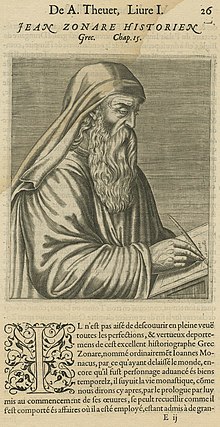Joannes Zonaras

JoannesorJohn Zonaras(Greek:Ἰωάννης ΖωναρᾶςIōánnēs Zōnarâs;c.1070 –c.1140) was aByzantineGreekhistorian, chronicler andtheologianwho lived inConstantinople(modern-dayIstanbul,Turkey). Under EmperorAlexios I Komnenoshe held the offices ofhead justiceand private secretary (protasēkrētis) to the emperor, but after Alexios' death, he retired to the monastery on the Island ofHagia Glykeria,[1](İncir Adası, in theBay of Tuzla), where he spent the rest of his life writing books.
Life
[edit]Almost nothing is known of Zonaras's life. However, various elements can be inferred from his own writings. In one of his writings he states that he "saw" the second marriage of an emperor. This could have been the marriage ofNikephoros IIIwithMaria of Alaniain late 1078 or perhaps even the marriage ofManuel I KomnenostoMaria of Antiochin 1161 which would put Zonaras' death significantly later.[2]It's not known with certainty if Zonaras served underJohn II Komnenos(r. 1118–1143), although this is still a possibility. Zonaras'Epitomeserved as the basis ofConstantine Manasses' chronicle, which was commissioned by Irene Komnene, the widow of thesebastokratorAndronikos Komnenos.Given that Irene died on (or shortly before) 1153, this work must have been writtenc.1150 or 1145. Furthermore, it's possible that Irene requested this shorter chronicle precisely because she had already seen Zonaras'Epitome.Therefore, it can be inferred that Zonaras had already died by 1145.[3]
Written works
[edit]His most important work,Extracts of History(Greek:Ἐπιτομὴ Ἱστοριῶν,Latin:Epitome Historiarum), in eighteen books, extends from the creation of the world to the death of Alexius (1118). The earlier part is largely drawn fromJosephus;for Roman history he chiefly followedCassius Dioup to the early third century.[4]Contemporary scholars are particularly interested in his account of the third and fourth centuries, which depend upon sources, now lost, whose nature is fiercely debated. Central to this debate is the work of Bruno Bleckmann, whose arguments tend to be supported by continental scholars but rejected in part by English-speaking scholars.[5]An English translation of these important sections has recently been published.[6]The chief original part of Zonaras' history is the section on the reign ofAlexios I Komnenos,whom he criticizes for the favour shown to members of his family, to whom Alexios entrusted vast estates and significant state offices. His history was continued byNicetas Acominatus.
Various ecclesiastical works have been attributed to Zonaras — commentaries on theChurch Fathersand the poems ofGregory of Nazianzus;lives of Saints; and a treatise on theApostolic Canons— and there is no reason to doubt their genuineness. The lexicon, however, which has been handed down under his name (ed.J. A. H. Tittmann1808) is probably the work of a certainAntonius Monachus(Stein'sHerodotus,ii.479 f).[4]The first ecclesiastical denunciation of the game ofchesson the part of theEastern Orthodox Churchwas voiced by Zonaras. It was during his retirement as a monk to the monastery ofMount Athosthat he wrote his commentary on the canons of the Eastern Church. TheQuinisext Councilrequired both clergy and laity to give up the use of dice (Canon 50). Zonaras wanted chess to also be included for clergy and laity to give up.
Zonaras, commenting on Canon 50, wrote, "Because there are some of the Bishops and clergy who depart from virtue and play chess (zatikron) or dice or drink to excess, the Rule commands that such shall cease to do so or be excluded; and if a Bishop or elder or deacon or subdeacon or reader or singer do not cease so to do, he shall be cast out: and if laymen be given to chess-playing and drunkenness, they shall be excluded. "[7]
Notes
[edit]- ^Fresco, Karen L. (2012). Wright, Charles D. (ed.).Translating the Middle Ages.Oxford, New York: Routledge. p. 150.ISBN9781315549965.RetrievedSep 3,2017.
- ^Neville, Leonora Alice (2018).Guide to Byzantine historical writing.David A. Harrisville, Irina Tamarkina, Charlotte Whatley. Cambridge. pp. 193–194.ISBN978-1-139-62688-0.OCLC1039703373.
{{cite book}}:CS1 maint: location missing publisher (link) - ^Treadgold, Warren(2013).The Middle Byzantine Historians.Springer. pp. 388–399.ISBN9781137280862.
- ^abChisholm 1911.
- ^Bleckmann,Die Reichskrise des III. Jahrhunderts in der spätantiken und byzantinischen Geschichtsschreibung: Untersuchungen zu den nachdionischen Quellen der Chronik des Johannes Zonaras.Munich, 1992.
- ^Banchich and Lane,Zonaras,2009.
- ^Murray, H.J.R.(2022) [1913].History of Chess(DigiCat ed.). p. 80.
References
[edit]- Kazhdan, Alexander, ed. (1991).Oxford Dictionary of Byzantium.Oxford University Press. p. 2229.ISBN978-0-19-504652-6.
- This article incorporates text from a publication now in thepublic domain:Chisholm, Hugh,ed. (1911). "Zonaras, Joannes".Encyclopædia Britannica.Vol. 28 (11th ed.). Cambridge University Press. p. 1002.
- Dictionary of Greek and Roman Biography and Mythology,William Smith,ed., Little, Brown and Company, Boston (1849), vol. III, p. 1331 ( "Joannes Zonaras" ).
- Harper's Dictionary of Classical Literature and Antiquities,Harry Thurston Peck,ed. (Second Edition, 1897), p. 1684 ( "Ioannes Zonaras" ).
- Oxford Classical Dictionary,N. G. L. Hammond and H. H. Scullard, eds., Clarendon Press, Oxford (Second Edition, 1970), p. 1147 ( "Johannes Zonaras" ).
- Thomas Banchich and Eugene Lane,The History of Zonaras from Alexander Severus to the Death of Theodosius the Great,Routledge (2009).
External links
[edit]- Complete works of Zonarasin Greek at thePerseus Digital Library
- Corpus Scriptorum Historiae Byzantinae:Ioannes Zonaras.Immanuel Bekkered. Greek text with Latin translation.vol. 1,vol. 2,vol. 3
- Editio princeps:Ioannis Zonarae Monachi, qui olim Byzantii Magnus Drungarius excubiaru[m] seu Biglae, & protosecretarius fuit, compendium Historiarum: in tres Tomos distinctum.3 vols., Greek text with Latin translation. Oporinus, Basel 1557.vol.1,vol. 2,vol.3(Bavarian State Library)
- Epitome Historionin Greek at theOpen Library
- Epitome Historionin Greek at thePoesia latina site
- French History form Severus Alexander to JustinianinWikisource
- Opera Omnia by Migne Patrologia Graeca with analytical indexes
- Lexicon of Zonaras in Greek at OPenn
